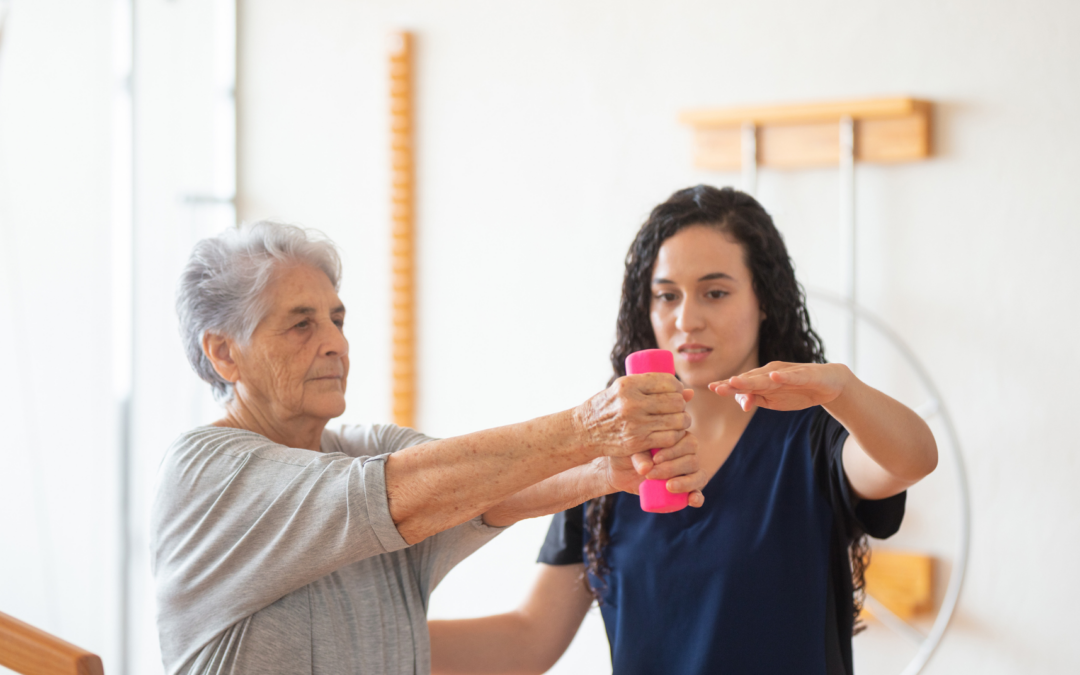Falls are one of the leading causes of injury and loss of independence among older adults.
As we age, changes in muscle strength, coordination, and reflexes can increase the risk of falls. However, with the right interventions, balance can be improved, and falls can be prevented.
Our physical therapists provide personalized balance training programs designed to enhance stability, confidence, and mobility.
>>>Schedule an appointment today and learn more about our balance and fall prevention programs.
Why Balance Declines with Age
Several factors contribute to reduced balance in older adults, including:
- Muscle Weakness: Loss of muscle mass over time can make it harder to maintain stability.
- Joint Stiffness and Pain: Conditions such as arthritis can reduce mobility and coordination.
- Vision Changes: Decreased depth perception and vision impairments make it harder to navigate obstacles.
- Inner Ear Issues: The vestibular system, which helps control balance, can weaken with age.
- Medications: Some medications can cause dizziness or drowsiness, increasing fall risk.
- Reduced Sensory Feedback: Nerve endings in the feet may become less sensitive, making it harder to detect changes in surface textures.
- Cognitive Changes: Slower reaction times or cognitive decline can make it harder to react quickly to sudden changes in movement.
Understanding these factors helps in developing targeted strategies to reduce the risk of falls and enhance mobility.
How Physical Therapy Can Help Prevent Falls
Physical therapy plays a crucial role in fall prevention for our geriatric patient population or anyone experiencing vertigo or vestibular issues by addressing strength, flexibility, and coordination deficits.
Our specialized programs for older patients focus on:
1. Strength and Stability Training
Stronger muscles provide a stable foundation for movement. Exercises targeting the legs, core, and lower back improve balance and coordination. Resistance training, such as using bands or weights, helps maintain muscle tone.
2. Gait and Posture Correction
Walking patterns change with age, sometimes leading to shuffling or uneven steps. A physical therapist can assess gait and recommend exercises to promote smoother movement. We also work on weight shifting and step training to reduce hesitancy while walking.
3. Balance Exercises
Activities such as single-leg stands, tandem walking, stability ball exercises, and controlled stepping drills help retrain the body to maintain balance in different situations. Practicing dynamic balance in standing and sitting positions is key to preventing falls.
4. Vestibular Rehabilitation
For those experiencing dizziness or vertigo, vestibular therapy can improve the function of the inner ear and reduce symptoms that contribute to falls. Specific head and eye movement exercises retrain the body’s ability to maintain stability.
5. Assistive Device Training
For patients in need of canes or walkers, proper training ensures safe usage and prevents falls related to improper equipment use. A therapist can assess if a mobility aid is necessary and teach patients how to use it correctly.
6. Dual-Task Training
Falls often happen when multitasking, such as walking while talking or carrying items. Physical therapy can incorporate cognitive and motor tasks to improve coordination under real-world conditions.
Simple Ways to Reduce Fall Risk at Home
Along with physical therapy, there are proactive steps older adults can take to make their homes safer:
- Remove Clutter: Keep walkways clear of loose rugs, cords, and furniture.
- Improve Lighting: Use nightlights and well-lit hallways to improve visibility at night.
- Install Handrails and Grab Bars: These provide extra support in bathrooms, stairways, and hallways.
- Wear Proper Footwear: Supportive, non-slip shoes help maintain stability.
- Stay Active: Regular movement keeps joints flexible and muscles strong.
- Use Non-Slip Mats: Place these in bathrooms and kitchens to reduce slipping risks.
- Monitor Medication Side Effects: Discuss potential dizziness-inducing medications with a doctor.
Who Can Benefit from Balance Training?
Balance training isn’t just for those who have already fallen. It’s also beneficial for:
- Older adults looking to stay independent and mobile.
- Patients recovering from joint replacement or surgery.
- People with neurological conditions such as Parkinson’s disease or stroke survivors.
- Anyone who experiences frequent dizziness or unsteadiness.
- Those who feel hesitant or fearful about walking outside or on uneven surfaces.
Why Choose Our Team for Fall Prevention?
Our team at East Athens, Danielsville, Madison, and Oconee and Watkinsville is committed to helping older adults improve their balance and confidence. Our personalized programs incorporate evidence-based techniques to reduce fall risk and enhance mobility.
Each treatment plan is designed with the patient’s needs in mind, ensuring that therapy is both effective and engaging.
Take the Next Step Toward Safety and Independence
If you or a loved one is concerned about balance and falls, our physical therapy programs can help. Strengthen your stability, improve mobility, and gain confidence in movement.
Contact us today or schedule an appointment online to start your journey toward fall prevention and improved well-being.

Licensed Physical Therapist, MDT certified, and the CEO of East Athens Physical Therapy, serving communities across Clarke, Oconee, Madison, and Morgan counties. With over two decades of experience and certification in the McKenzie Method, Jim Mike combines hands-on care with cutting-edge technology to help patients recover faster and stay active.


